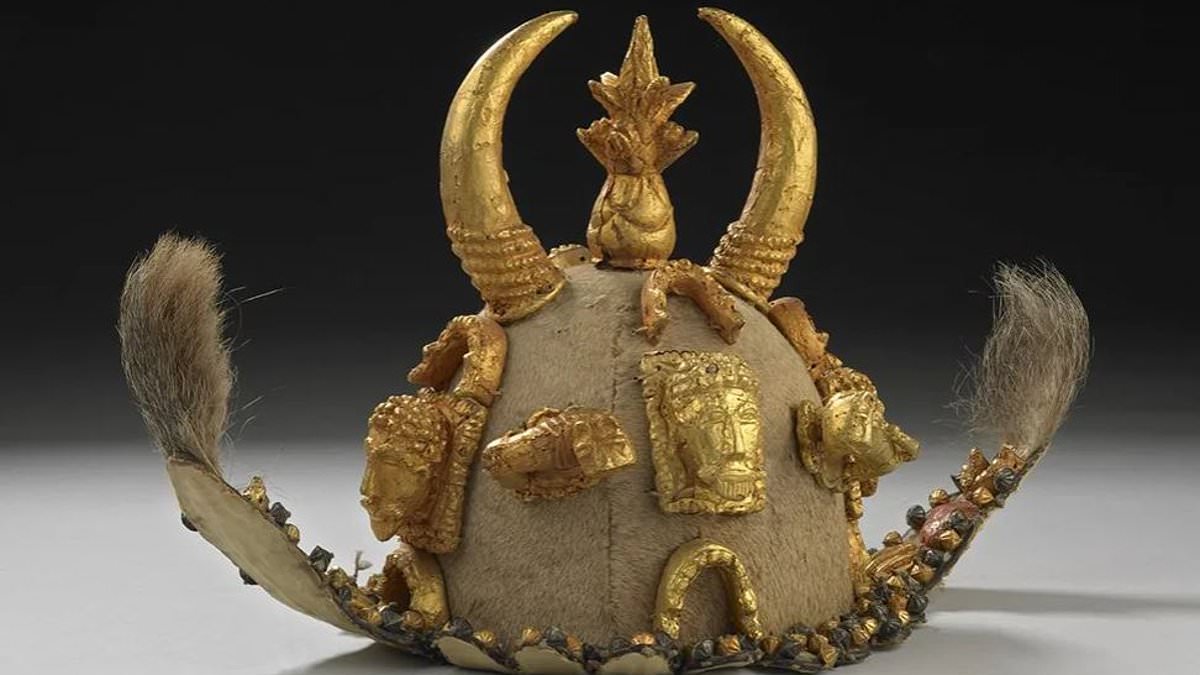The UK is to loan back some the ‘crown jewels’ of Ghana, 150 years after they were ‘stolen’ from the court of an Asante king.
The 32 pieces of Asante Gold, named after the African empire from which they were taken, will be returned to the country from the Victoria & Albert Museum (V&A) and the British Museum.
The items are being given Otumfo Osei Tutu II – the current King of Asante – and not the Ghanaian government, on a three-year loan agreement with the option to extend for a further three years.
The move is seen as a way for museums – some of which are banned by law from giving back contested items – to return them to their countries of origin.
It is believed that the historic loan deal could create a path for other controversial items, such as the Elgin Marbles, to be returned to the places from which they were taken.

A ceremonial cap worn by courtiers in the royal courts of the Asante Empire is set to be returned to modern day Ghana


A total of 32 Asante gold items are set to be loaned to the current king for three years, including this Asante gold torc (left) and ring (right)
However, some countries are believed to be reticent about using this avenue as it could be used to confirm that Britain has ownership over the items.
The Asante Gold, which was taken from the African kingdom in the 19t century, is set to be returned following pressure from Osei Tutu, who was present for the Coronation of King Charles III last year.
Tristram Hunt, the former Labour MP who is now director of the V&A, said they were similar to ‘our Crown Jewels’.
The V&A is loaning 17 pieces while the British Museum is lending 15, with Mr Hunt telling the BBC the when it comes to ‘objects with origins in war and looting in military campaigns, we have a responsibility to the countries of origin to think about how we can share those more fairly today’.
‘It doesn’t seem to me that all of our museums will fall down if we build up these kind of partnerships and exchanges.’
He insisted it wasn’t ‘restitution by the back door’, with the items set to go on display at the Manhyia Palace Museum in Kumasi, the capital of the Asante region as part of the King’s silver jubilee celebrations.
The objects, which include a sword of state, gold badges worn by officials, as well as ceremonial caps and pipes, are believed to be invested with spirits of former Asante kings.
The Asante, also known as the Ashanti, are a people who ruled over vast swathe of modern day Ghana between the 1700s and 1900s.

An Asante gold model harp which was given to the British Museum in the early 19th century will be loaned

As will a sword of state taken from the royal court following conflicts between the British Empire and the Asante Empire

A ceremonial pipe which will be transferred as part of the agreement, which could be extended by a further three years if both parties agree

There have been suggestions a similar agreement could be used to return the Elgin Marbles (pictured) to Greece
The Asante Empire gained vast wealth through its gold and agricultural trade, while also partaking in slave trading.
Between 1824 and 1900 the empire was involved in five conflicts with the British Empire and its African allies as it tried to enforce control over coastal areas of modern day Ghana.
While Asante won a number of these, British success in the fourth and fifth conflicts saw them annex the empire and burn the capital of Kumasi to the ground.
The city and royal palace was then looted, with the gold and other artefacts either being sold or given to Britain as reparations for the cost of the wars.
It is believed that a similar agreement could be used to return the Elgin Marbles to Greece, while at the same time guaranteeing they would be returned to Britain.
However, the terms of the deal state that the country receiving the items affirms they belong to Britain, something that is a sticking point for Greek officials.
A source at the British Museum told the Telegraph they were ‘working to strengthen our relationship with our colleagues in Greece’.
They added: ‘We are still exploring if there is an arrangement that would allow some of the Parthenon sculptures to travel to Greece… We may not succeed and reach an agreement, but believe it is worth trying to find a way through to mutual benefit.’
Former Chancellor George Osborne, who is chair of trustees at the British Museum, has previously said he is looking for a ‘practical, pragmatic and rational way forward’.
